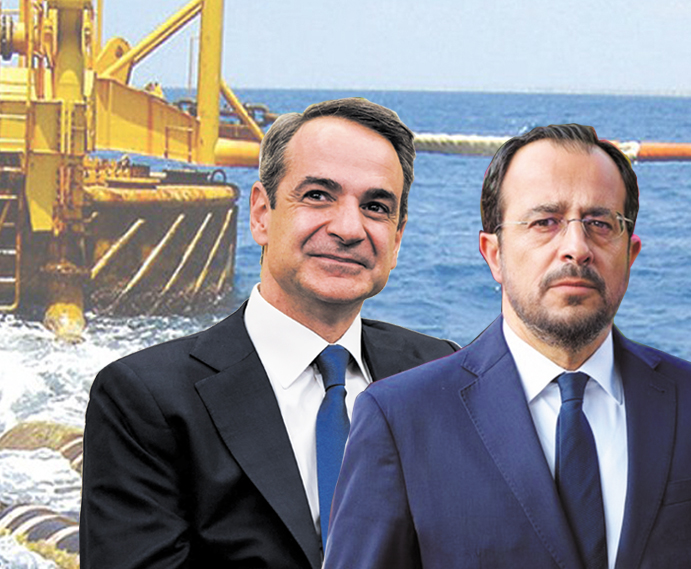A longstanding difference over the issue of when expenses should be paid forms the core of the dispute between Cyprus’ energy regulator and the project promoter for the Great Sea Interconnector, sources told the Cyprus Mail on Tuesday.
The matter regained traction after President Nikos Christodoulides made some strong statements about the project promoter over the weekend, declaring that the Cypriot state would not be “blackmailed” by Admie – Greece’s independent power transmission operator, the project promoter for the GSI.
The GSI is a planned subsea cable linking the electricity grids of Cyprus and Greece.
The president’s comments had been prompted by a report published by daily Phileleftheros.
On Monday, the Cyprus energy regulatory authority (Cera) confirmed having received a letter from Admie. Without going into details, the regulator said that Admie’s letter concerned the latter’s expenses on the GSI project so far.
In the communiqué, Admie appealed a decision taken by Cera in July this year. At the time, Cera had verified only €82 million in capital expenditures (capex) on the part of Admie, whereas Admie itself claimed it spent €251 million up until that time.
Later, following Christodoulides’ outburst, Admie issued a ‘clarification’ saying it was not claiming the €251 million immediately, only that it was challenging the €82 million number cited by Cera.
But the commotion led both Nicosia and Athens to issue statements affirming that their relations were as strong as ever. The Greek state is a majority shareholder in Admie.
On Tuesday, the president reiterated that “no crisis” exists between the governments of Cyprus and Greece.
“There may be some technocratic differences in relation to the project,” he added.
The Cyprus Mail learns that Admie’s letter to Cera was dated September 26. The letter was obtained by Phileleftheros. It’s unclear when exactly the president became apprised of it.
Sources familiar with the matter said the dispute dates back several years – to the time when EuroAsia Interconnector Ltd, a Cypriot company, ran the project. In October 2023 EuroAsia – plagued by financing issues – dropped out, handing the baton to Greece’s Admie.
Our sources explained that when EuroAsia was the project promoter, it had struck up an agreement with Cera stipulating that it would recover its expenditures once the cable project was finished.
Later, EuroAsia wanted to renegotiate this clause. The Cypriot regulator relented, but only partly – a revised agreement was drawn up stating that the promoter “may” recoup a part of its expenses prior to completion of the interconnector.
But when Admie took over, it strenuously objected to the vague “may” clause. The Greek entity wanted an explicit reference that it could recoup expenses as they are incurred, not after the project is finished.
The difference lies in how the Cypriot and Greek energy regulators do business. In Cyprus, when it comes to regulated projects the standard practice is to reimburse the implementing entity after, not during.
By contrast, in Greece – and several other European countries – the implementing entity recoups expenses as they occur.
This key dispute between Cypriot authorities and Admie lingers to this day.
The September 26 letter from Admie was simply the most recent manifestation of this.
Our sources said that Cera is not claiming that Admie is ‘lying’ about the €251 million number.
“Rather, Cera is saying ‘OK show us the invoices’.”
The Cypriot regulator claims that only €82 million in capex can be documented.
In July 2024, Greece and Cyprus entered into an interstate agreement, under which Cyprus would pay €25 million a year into the project for the 2025-2030 period – for a total of €125 million.
These amounts, paid by the Cypriot state, were guaranteed no matter what. They provided a revenue stream for Admie during the construction phase.
However, the interstate agreement did not resolve the underlying difference between Cera and Admie regarding the timing of reimbursement for expenses.
And meantime, Admie’s expenditures are accruing.
Our sources also explained that the €251 million – should Cera verify it in the future – does not represent Cyprus’ share.
Rather, Cyprus’ share is 63 per cent of the €251 million, the 37 per cent belonging to Greece, per the split agreed between the two countries.
As time passes, Admie’s claims will grow beyond the €251 million.
The entire interconnector project is said to carry a price tag of €1.9 billion.
But beyond disagreements over invoicing, the elephant in the room remains Turkish interference.
Depth surveys – to map out the precise route of the subsea cable – have stopped. It’s understood that, to date, depth surveys have been carried out only in the territorial waters off Crete and Cyprus – up to six nautical miles.
No surveys have taken place in international waters, because Turkey says the area in question falls within its ‘continental shelf’.
This leaves a huge gap in terms of the seabed that still needs to be mapped out.
